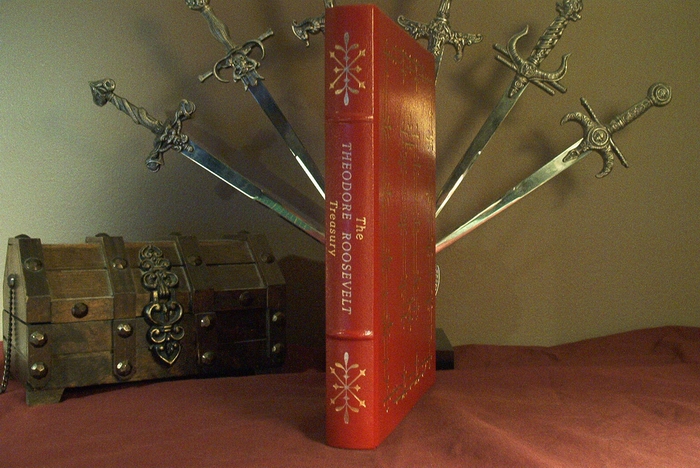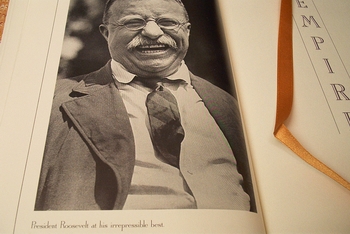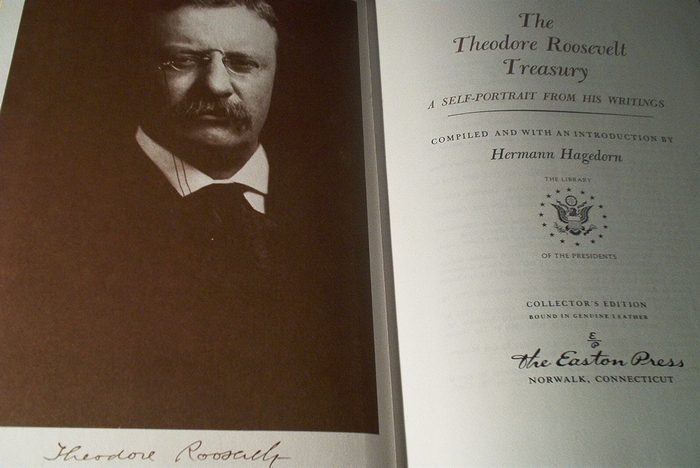Easton Press Theodore Roosevelt books
Theodore Roosevelt: A Biography - Henry F. Pringle - 1987The Theodore Roosevelt Treasury: A Self-Portrait from His Writings - 1988
Roosevelt's Rough Riders - Virgil Carrington Jones - 1991
African Game Trails - Theodore Roosevelt - 1992
Writings of Theodore Roosevelt: 3 volume set - 1996
Vol. 1 - An Autobiography
Vol. 2 - The Rough Riders
Vol. 3 - The Strenuous Life
Theodore Roosevelt: The Last Romantic - H. W. Brands - 2001
The Naval War of 1812 - Library of Military History - Theodore Roosevelt - 2005
Franklin Library Theodore Roosevelt books
The Rise of Theodore Roosevelt - Edmund Morris - Pulitzer Prize Classics - 1985President Theodore Roosevelt biography
President Theodore Roosevelt, often referred to as Teddy or TR, was a dynamic and larger-than-life figure whose legacy continues to shape American politics and society. Born on October 27, 1858, in New York City, Roosevelt's upbringing was one of privilege and opportunity. However, he faced numerous health challenges as a child, including asthma, which he overcame through sheer determination and physical exercise. Roosevelt's early adulthood was marked by a diverse range of experiences. He attended Harvard University, where he excelled academically and developed a passion for natural history and outdoor pursuits. After graduating, Roosevelt embarked on a rapid ascent in politics, serving as a member of the New York State Assembly and later as a Civil Service Commissioner in Washington, D.C. It was during his time in Washington that Roosevelt gained national prominence for his efforts to combat corruption and promote government reform. His tenure as Assistant Secretary of the Navy under President William McKinley further solidified his reputation as a rising star in the Republican Party.In 1898, Roosevelt's life took a dramatic turn when he resigned from his government post to lead the Rough Riders, a volunteer cavalry regiment, in the Spanish-American War. His bravery and leadership during the Battle of San Juan Hill earned him widespread acclaim and propelled him to national fame.
Roosevelt's political career reached its zenith in 1901 when he ascended to the presidency following McKinley's assassination. As President, Roosevelt pursued an ambitious agenda of progressive reform, earning him the nickname the "Trust Buster" for his efforts to regulate big business and protect consumers. He also championed conservation, establishing national parks, forests, and monuments to preserve America's natural beauty for future generations. Roosevelt's foreign policy was equally robust, as he sought to assert America's influence on the world stage. His efforts to broker peace in the Russo-Japanese War earned him the Nobel Peace Prize in 1906, making him the first American to receive the prestigious award.
After leaving office in 1909, Roosevelt remained active in public life, advocating for progressive causes and embarking on a well-publicized safari to Africa. He made an unsuccessful bid for the presidency in 1912 as the candidate of the Progressive Party, but his impact on American politics endured long after his death on January 6, 1919. In conclusion, President Theodore Roosevelt's life was characterized by boundless energy, unwavering determination, and a commitment to public service. His presidency transformed the nation and left an indelible mark on American history, earning him a place among the country's most revered leaders.
Theodore Roosevelt: A Biography by Henry F. Pringle
Theodore Roosevelt: A Biography by Henry F. Pringle is a gripping exploration of one of America's most dynamic and influential leaders. Through meticulous research and vivid storytelling, Pringle paints a vivid portrait of Roosevelt's life, from his privileged upbringing to his transformative presidency. This biography offers readers a captivating glimpse into the complexities of Roosevelt's character, his relentless pursuit of progress and reform, and his enduring legacy as a champion of the American spirit. Engaging and insightful, Pringle's biography is a must-read for anyone interested in the life and legacy of Theodore Roosevelt.Mornings on Horseback
Mornings on Horseback by David McCullough is a captivating biography that offers readers a vivid portrayal of the formative years of Theodore Roosevelt, the 26th President of the United States. With meticulous research and engaging prose, McCullough takes readers on a journey through Roosevelt's childhood, adolescence, and early adulthood, providing insight into the experiences and influences that shaped his remarkable life. Theodore Roosevelt was a complex and dynamic figure from a young age. McCullough explores Roosevelt's upbringing in detail, painting a portrait of a precocious and energetic child who was deeply influenced by his loving family, particularly his father, Theodore Roosevelt Sr. As a child, Roosevelt struggled with various health ailments, including asthma, which often left him frail and sickly. However, his parents encouraged him to embrace physical activities and outdoor pursuits, instilling in him a lifelong love of nature and adventure.McCullough vividly captures Roosevelt's coming of age in the vibrant and rapidly changing landscape of late 19th-century America. From his time at Harvard University, where he distinguished himself as a scholar and athlete, to his early career in politics, Roosevelt's path to prominence was marked by ambition, drive, and a strong sense of duty. One of the central themes of Mornings on Horseback is Roosevelt's quest for self-improvement and personal growth. McCullough delves into Roosevelt's intellectual curiosity and voracious appetite for learning, as well as his unwavering commitment to public service and social reform.
Throughout the biography, McCullough skillfully weaves together historical context and personal anecdotes to provide readers with a deeper understanding of Roosevelt's character and motivations. From his travels in the American West to his experiences as a rancher and adventurer, Roosevelt's early life was a rich tapestry of experiences that would shape his future as a leader and statesman. In conclusion, Mornings on Horseback offers readers a compelling portrait of Theodore Roosevelt's formative years, illuminating the origins of his boundless energy, indomitable spirit, and enduring commitment to public service. McCullough's biography is a testament to Roosevelt's remarkable journey from a sickly child to one of America's most beloved and influential presidents, showcasing the transformative power of perseverance, resilience, and determination.
The Theodore Roosevelt Treasury
Theodore Roosevelt Treasury is a comprehensive anthology that delves into the multifaceted life and enduring legacy of one of America's most iconic figures. Compiled by esteemed historians and scholars, this treasury offers readers a captivating journey through the life, achievements, and ideals of Theodore Roosevelt, the 26th President of the United States. Born on October 27, 1858, in New York City, Theodore Roosevelt emerged as a dynamic and influential leader during a transformative period in American history. From his early years as a sickly child determined to overcome adversity through physical exertion to his rise as a statesman, soldier, and conservationist, Roosevelt's life was marked by courage, resilience, and a relentless pursuit of excellence.The Theodore Roosevelt Treasury provides readers with a rich tapestry of Roosevelt's most notable speeches, essays, letters, and writings, offering insight into his thoughts on a wide range of topics, including politics, conservation, social justice, and the responsibilities of citizenship. Through his eloquent prose and stirring rhetoric, Roosevelt inspires readers to embrace the values of courage, integrity, and civic duty. One of the central themes of the treasury is Roosevelt's commitment to progressive reform and social justice. As President, he spearheaded efforts to combat corruption, regulate big business, and protect workers' rights, earning him the admiration of millions of Americans and the nickname the "Trust Buster." His advocacy for the conservation of natural resources also left an indelible mark on the nation, as evidenced by his establishment of national parks, forests, and wildlife refuges.
Theodore Roosevelt Treasury also explores Roosevelt's adventurous spirit and love of the outdoors. From his expeditions in the American West to his famous African safari, Roosevelt embodied the rugged individualism and pioneering spirit that defined the American experience. Beyond his domestic achievements, Roosevelt's foreign policy legacy is also examined in the treasury. His "Big Stick" diplomacy and efforts to assert American influence in world affairs laid the groundwork for the United States' emergence as a global superpower in the 20th century.
In conclusion, The Theodore Roosevelt Treasury offers readers a comprehensive and illuminating portrait of a man whose impact on American history continues to resonate to this day. Through his words and actions, Roosevelt embodied the spirit of American exceptionalism and inspired generations of leaders to strive for greatness. This treasury serves as a timeless tribute to his enduring legacy and a testament to the enduring power of his ideas.
Roosevelt's Rough Riders
Roosevelt's Rough Riders by Virgil Carrington Jones is a compelling biography that chronicles the remarkable exploits of Theodore Roosevelt and the 1st United States Volunteer Cavalry Regiment, famously known as the Rough Riders. Through meticulous research and vivid storytelling, Jones brings to life the thrilling saga of this legendary military unit and its charismatic leader. Theodore Roosevelt, already a rising political figure, resigned from his position as Assistant Secretary of the Navy to join the Rough Riders during the Spanish-American War in 1898. Jones delves into Roosevelt's motivations for forming this unique regiment, which consisted of a diverse mix of cowboys, miners, college athletes, and other volunteers from across the country.Assembled in San Antonio, Texas, the Rough Riders underwent intense training before being deployed to Cuba to participate in the pivotal Battle of San Juan Hill. Jones vividly describes the Rough Riders' harrowing journey through the jungles of Cuba, their fierce combat against Spanish forces, and their triumphant charge up the strategic hill, which played a crucial role in securing victory for the United States. Jones also provides readers with intimate portraits of the men who served under Roosevelt's command, capturing their camaraderie, bravery, and sacrifices amidst the chaos of war. From the daring exploits of Buffalo Soldiers to the heroic deeds of the famed Rough Rider cowboys, each individual story adds depth and humanity to the larger narrative of the Rough Riders' campaign.
Beyond the battlefield, Roosevelt's Rough Riders explores the lasting impact of the Spanish-American War on American society and Roosevelt's own political career. Roosevelt's leadership and bravery during the conflict propelled him to national fame and laid the groundwork for his eventual ascension to the presidency. In conclusion, Roosevelt's Rough Riders is a gripping account of courage, sacrifice, and camaraderie in the face of adversity. Jones' biography offers readers a captivating glimpse into a pivotal moment in American history and the extraordinary men who played a part in it, cementing their place in the annals of military legend.
African Game Trails
African Game Trails by Theodore Roosevelt is a captivating autobiographical account that chronicles Roosevelt's exhilarating adventures during his expedition to Africa. Published in 1910, the book offers readers a firsthand glimpse into Roosevelt's epic safari, which took place from 1909 to 1910, and provides vivid descriptions of the African landscape, wildlife, and people he encountered along the way. Theodore Roosevelt, already renowned as a statesman, soldier, and outdoorsman, embarked on this ambitious journey to Africa shortly after his presidency ended in 1909. With a desire to explore the untamed wilderness and observe the continent's magnificent wildlife, Roosevelt set out on what would become one of the most legendary safaris in history. In African Game Trails, Roosevelt vividly recounts his experiences hunting big game, including lions, elephants, rhinoceroses, and buffalo. However, the book is much more than a mere hunting expedition; it is a testament to Roosevelt's deep appreciation for nature and his commitment to conservation.Throughout the narrative, Roosevelt reflects on the importance of wildlife conservation and the need to preserve Africa's natural heritage for future generations. His encounters with indigenous peoples, such as the Maasai and Kikuyu tribes, offer insights into their way of life and cultural traditions, fostering a greater understanding and appreciation for Africa's diverse cultures. Roosevelt's prose is both eloquent and evocative, transporting readers to the heart of the African wilderness and immersing them in the sights, sounds, and sensations of the safari. His keen observations of the flora and fauna, as well as his encounters with fellow hunters and guides, paint a vivid picture of life on the African savannah. Beyond its literary merits, African Game Trails is also a valuable historical document that sheds light on the attitudes and perspectives of early 20th-century explorers and adventurers. Roosevelt's enthusiasm for the natural world and his commitment to the principles of conservation continue to inspire readers to this day.
In conclusion, African Game Trails is a captivating adventure tale and a poignant meditation on the beauty and fragility of the natural world. Roosevelt's passion for exploration, his reverence for wildlife, and his unwavering spirit of adventure make this book a timeless classic that will continue to enthrall readers for generations to come.
The Last Romantic
Theodore Roosevelt: The Last Romantic by H. W. Brands is a compelling portrait of one of America's most captivating figures. With meticulous research and engaging prose, Brands brings to life the complex and larger-than-life personality of Theodore Roosevelt, capturing his boundless energy, adventurous spirit, and unwavering commitment to public service. From his early days as a sickly child to his rise to the presidency and beyond, Brands explores Roosevelt's remarkable journey with insight and depth, offering readers a captivating glimpse into the life of this iconic American leader.The Naval War of 1812
The Naval War of 1812 by Theodore Roosevelt is a seminal work that offers a detailed and comprehensive account of one of the most significant conflicts in American history. Originally published in 1882, this book showcases Roosevelt's keen intellect, meticulous research, and passion for naval history. In The Naval War of 1812, Roosevelt meticulously examines the maritime battles and strategic maneuvers that shaped the course of the War of 1812 between the United States and Great Britain. Drawing upon a wide range of primary sources, including official naval records, personal correspondence, and eyewitness accounts, Roosevelt provides readers with a thorough analysis of the key events, personalities, and naval tactics of the war.One of the central themes of the book is Roosevelt's admiration for the courage and seamanship displayed by American sailors and naval officers during the conflict. He highlights their resourcefulness, bravery, and determination in the face of superior British forces, and celebrates their role in securing America's maritime independence. Roosevelt also offers critical assessments of the strategic decisions made by American and British commanders, analyzing their strengths, weaknesses, and overall effectiveness in prosecuting the war at sea. His insights shed light on the complexities of naval warfare in the early 19th century and provide valuable lessons for military historians and strategists. Beyond its scholarly contributions, The Naval War of 1812 is also a testament to Roosevelt's literary talents and his ability to engage readers with his vivid prose and vivid descriptions of naval battles. His narrative skillfully captures the drama, excitement, and human drama of life aboard ship during wartime, immersing readers in the sights, sounds, and smells of naval combat.
In conclusion, The Naval War of 1812 stands as a landmark work in the field of naval history and a testament to Theodore Roosevelt's enduring legacy as a scholar, statesman, and military historian. Through his meticulous research and engaging storytelling, Roosevelt offers readers a compelling and insightful account of a pivotal moment in American naval history that continues to resonate to this day.
Teddy Roosevelt quotes
"Speak softly and carry a big stick; you will go far."
"Do what you can, with what you have, where you are."
"Believe you can and you're halfway there."
"It is hard to fail, but it is worse never to have tried to succeed."
"Far better is it to dare mighty things, to win glorious triumphs, even though checkered by failure... than to rank with those poor spirits who neither enjoy nor suffer much, because they live in a gray twilight that knows not victory nor defeat."
"The only man who never makes a mistake is the man who never does anything."
"The first requisite of a good citizen in this Republic of ours is that he shall be able and willing to pull his weight."
"The credit belongs to the man who is actually in the arena, whose face is marred by dust and sweat and blood..."
"The best executive is one who has sense enough to pick good people to do what he wants done, and self-restraint to keep from meddling with them while they do it."
"Keep your eyes on the stars, and your feet on the ground."




Comments
Post a Comment
Share your best book review and recommendation